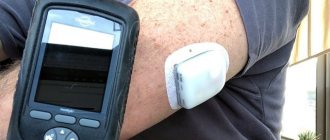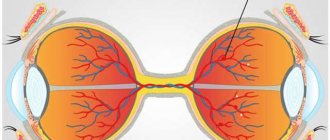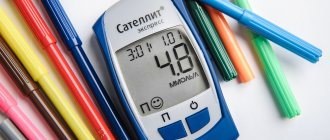Diabetes insipidus is a violation of water-salt balance, occurring either due to insufficient production of the hormone vasopressin (antidiuretic), or due to kidney disease, in which the tubules become insensitive to this hormone. The disease also has another name – diabetes. This condition is completely consistent with the clinical picture. With this disease, a person produces an abnormally large amount of urine, which causes dehydration and the patient experiences constant thirst. This is a rare disease, which currently most often occurs as complications of neurosurgical operations and certainly requires contact with an endocrinologist.
At CELT you can consult an endocrinologist.
- Initial consultation – 3,500
- Repeated consultation – 2,300
Make an appointment
Causes of diabetes
The reasons are divided into the following groups:
- central;
- renal;
- autoimmune.
Causes of a central nature are most often tumors or diseases that destroy the brain structures (hypothalamus, pituitary gland) in which antidiuretic hormone is synthesized. In addition to tumors, a syphilitic, malarial or tuberculous process can have a destructive effect when the lesions are located in the hypothalamus or pituitary gland. The normal functioning of these parts is disrupted by traumatic brain injury or brain surgery. Sometimes diabetes develops after meningoencephalitis.
Renal forms of diabetes can be congenital or acquired. They are caused by kidney diseases - renal failure, amyloidosis, infections, overdose of lithium drugs, excess calcium in the blood (hypercalcemia). Congenital is a slow loss of vision accompanied by diabetes or Wolfram syndrome (this syndrome also includes diabetes mellitus and deafness, but not all components may appear).
Autoimmune causes of the disease involve the formation of antibodies to cells that produce ADH, while its concentration in the blood decreases.
Pregnancy can also provoke diabetes, however, in this case the disease is temporary. It develops more often in women with kidney problems. Some time after childbirth, health usually returns to normal.
Nutrition rules
Everyone knows that patients with diabetes have a “special” relationship with sugars. But what can be said about nutrition if the disease is sugar insipidus? In this case, the restriction will affect another product – salt. If the patient does not suffer from renal failure, then it is possible to replace the salt with a dietary supplement, for example, Sanasol.
A diet for this disease involves limiting the consumption of protein foods (no more than 70 g per day). The patient is recommended dietary table No. 7.
The diet includes the following foods and drinks:
- Berries and fruits with a sweet and sour taste.
- Fresh vegetables.
- Freshly squeezed juices, kvass, teas – herbal and green.
- Water with lemon juice.
- Fermented milk products and drinks.
- Lean types of meat.
- Low-fat fish and seafood.
Classification
In accordance with the etiology, central and renal forms of the disease are distinguished. In this case, the central one is divided into 2 more groups:
- idiopathic or due to an unknown cause;
- symptomatic, developing after another illness.
The idiopathic form is a congenital decrease in the amount of hormone produced. There is no way to influence this process, and it is also impossible to recover.
The course of the symptomatic form is more favorable; after the cessation of the underlying disease, diabetes may also cease. Such cases happen quite often.
Symptoms
There are two main symptoms of diabetes insipidus:
- polyuria or excessive urine output;
- polydipsia or unquenchable thirst.
These symptoms are mandatory, and all others are optional.
Normally, an adult excretes no more than 3 liters of urine per day. The amount can be reduced in unfavorable conditions (heat, lack of water, fever), this is a normal adaptive reaction, while the concentration of salts and specific gravity also increase proportionally. An increase in the amount of daily urine is always a manifestation of the disease.
A person with diabetes insipidus can excrete from 4 to 20 or even 30 liters of urine per day. The less antidiuretic hormone is produced, the more severe the disease, the more urine is released. The urine of sick people does not have a characteristic straw color or smell, and the salt concentration is low. Its specific gravity (relative density or amount of dissolved salts and urea) is also low, no more than 1003 (the normal specific gravity of urine in adults is from 1012 to 1025).
Normally, water is absorbed back from primary urine in the kidney tubules, but with diabetes this does not happen; the entire amount is excreted. Constant urges interfere with work, rest and life in general. Due to constant trips to the toilet, a person does not get enough sleep, becomes irritable, absent-minded, hot-tempered, and unbalanced. Thirst torments a sick person constantly; the amount of liquid drunk is approximately equal to the amount of urine excreted.
In children, the onset of the disease is sometimes manifested by enuresis (bedwetting), which should be a reason for examination.
Despite the huge amount of fluid absorbed, a person suffers from dehydration. Little saliva, tears and sweat are produced, the skin is dry, hair and nails are brittle. Blood pressure is almost always low due to a decrease in circulating blood volume. Appetite decreases, vomiting and headache occur. In advanced cases, pituitary insufficiency develops, when the production of all other pituitary hormones suffers, which entails multiple organ disorders.
Sexual function suffers: in women the menstrual cycle is disrupted, in men - potency.
If a person does not receive treatment or does not replenish the amount of lost fluid, then dehydration ends in blood thickening and collapse with all the ensuing negative consequences.
Pathogenesis
Neurosecretory cells present in the hypothalamus are capable of regulating the production of antidiuretic hormone (ADH) - vasopressin , as well as oxytocin . ADH regulates the reabsorption of water in the collecting ducts of the kidneys by increasing the concentration of urine and reducing its volume. Vasopressin is normally produced constantly to maintain plasma osmotic pressure at a level of 285 mmol/kg; when this indicator falls, ADH secretion is inhibited, and when it rises, hypothalamic osmoreceptors transmit this information to the nuclei of the hypothalamus and stimulate its release.
Normally, these two hormones accumulate in the tissues of the posterior lobe of the pituitary gland (neurohypophysis) and, if necessary, are released into the bloodstream. If there is an insufficient level of vasopressin in the circulating blood, this leads to a disruption in the absorption of water. As a result, polyuria occurs - excessive urination, which is also characteristic of diabetes mellitus.
Features of the synthesis and secretion of vasopressin
Thus, diabetes is based on a violation of the concentrating ability of the kidneys as a result of a deficiency of antidiuretic hormone or a violation of the sensitivity of the renal tubules to its effects. At the same time, the resulting feeling of thirst is a conscious sensation of the need for water, which is stimulated by various factors and causes the secretion of vasopressin. These include a hypertensive environment, a decrease in blood volume, a decrease in blood pressure , and a plasma osmolality level of 295 mOsmol/kg. Normally, this provokes the release of urine of maximum concentration. Thirst is a kind of brake to prevent dehydration that exceeds the compensatory forces of the antidiuretic system. In addition, diabetes can cause increased destruction of antidiuretic hormone in the liver, kidneys and placenta.
Diagnosis of the disease
Diagnosis begins with a study of the properties of urine: daily amount, relative density and osmolarity, which is used to judge the concentration function of the kidneys. Other necessary studies, without which a complete diagnosis is impossible:
- blood potassium and calcium levels;
- fasting blood glucose;
- blood ADH;
- Ultrasound and kidneys;
- kidney biopsy (if indicated);
- fundus examination;
- MRI of the brain.
Your doctor may order other tests if any organ failure is suspected. It is advisable to conduct a psychoneurological examination in children, since their congenital disorders are often combined with pathology in this area.
To clarify the diagnosis, dry eating may be prescribed for 10 or 12 hours. If a person is sick, then during this time body weight can decrease by 5% due to fluid loss.
Treatment of diabetes insipidus
Treatment depends on the form and cause of the disease. Symptomatic diabetes is treated by treating the underlying cause - removing the tumor, targeting syphilis, malaria or tuberculosis.
In order to facilitate the functioning of the kidneys, a diet containing a minimum of animal protein is prescribed. Instead, food should contain a lot of carbohydrates and fats. You need cereals, vegetables and fruits, dairy products, natural juices and fruit drinks. Food is prepared without salt, salt is added at the table, and no more than 5 g (teaspoon) of table salt is allowed per day. It is better to drink not water, but natural compotes or juices.
During treatment, a synthetic analogue of the antidiuretic hormone, Desmopressin, is prescribed. The medicine is available in the form of tablets and nasal spray. Treatment begins with drops in the nose, selects the desired dose, and then switches to tablets. The dosage is selected individually; the daily amount can be divided into 2 doses. There is no addiction; complete destruction of the drug occurs in the intestines. The medicine is prescribed only after a comprehensive examination; there are contraindications.
According to indications, drugs that indirectly stimulate the production of natural ADH may be prescribed: Chlorpropamide, Carbamazepine and others.
To reduce the amount of urine excreted, products containing sulfonamide groups can be used. The diuretic Hydrochlorothiazide works especially well. The medicine reduces the reabsorption of sodium and instead removes bicarbonates and phosphates. Does not change the acid-base state. Enhances the excretion of magnesium and urates, retains calcium in the body. All this leads to the fact that the amount of urine excreted in patients with diabetes insipidus decreases, and its concentration increases.
Consequences and complications
The chronic course of the disease and constant intake of large amounts of fluid leads to:
- dehydration of the body, causing weakness, tachycardia , hypotension , collapse , disturbance of the rheological properties of blood;
- an increase in the volume of the stomach and its prolapse;
- changes in the secretion of gastric juice and bile formation;
- the addition of clinical manifestations of gastrointestinal dysfunction, including decreased salivation, belching, epigastric pain, the development of hypoanacidic gastritis , constipation and colitis , biliary dyskinesia ;
- expansion of the ureter, ureters and renal pelvis;
- frequent headaches , insomnia , convulsions , psychomotor agitation, as well as decreased mental and mental abilities.
Forecast
Diabetes insipidus does not pose a threat to life, since replacement therapy with Desmopressin can be used throughout your life. With proper treatment, the ability to work does not even suffer. The exception is the renal form in children, since the basis is an anatomical defect.
CELT doctors are ready to help any day, providing the patient with a full life. If you or your loved ones are faced with such a disease, make an appointment with a CELT endocrinologist.
Make an appointment through the application or by calling +7 +7 We work every day:
- Monday—Friday: 8.00—20.00
- Saturday: 8.00–18.00
- Sunday is a day off
The nearest metro and MCC stations to the clinic:
- Highway of Enthusiasts or Perovo
- Partisan
- Enthusiast Highway
Driving directions







